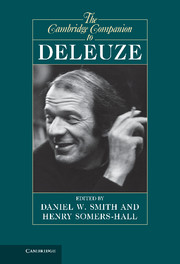Book contents
- Frontmatter
- Contents
- Contributors
- Abbreviations
- Introduction
- 1 Deleuze and the history of philosophy
- 2 Difference and Repetition
- 3 The Deleuzian reversal of Platonism
- 4 Deleuze and Kant
- 5 Phenomenology and metaphysics, and chaos
- 6 Deleuze and structuralism
- 7 Deleuze and Guattari
- 8 Nomadic ethics
- 9 Deleuze’s political philosophy
- 10 Deleuze, mathematics, and realist ontology
- 11 Deleuze and life
- 12 Deleuze’s aesthetics of sensation
- 13 Deleuze and literature
- 14 Deleuze and psychoanalysis
- 15 Deleuze’s philosophical heritage
- Bibliography
- Index
- References
14 - Deleuze and psychoanalysis
Published online by Cambridge University Press: 05 December 2012
- Frontmatter
- Contents
- Contributors
- Abbreviations
- Introduction
- 1 Deleuze and the history of philosophy
- 2 Difference and Repetition
- 3 The Deleuzian reversal of Platonism
- 4 Deleuze and Kant
- 5 Phenomenology and metaphysics, and chaos
- 6 Deleuze and structuralism
- 7 Deleuze and Guattari
- 8 Nomadic ethics
- 9 Deleuze’s political philosophy
- 10 Deleuze, mathematics, and realist ontology
- 11 Deleuze and life
- 12 Deleuze’s aesthetics of sensation
- 13 Deleuze and literature
- 14 Deleuze and psychoanalysis
- 15 Deleuze’s philosophical heritage
- Bibliography
- Index
- References
Summary
What happens when psychoanalysis encounters Deleuze? Ultimately, the result is its transformation into schizoanalysis, of course, thanks in large part to the collaboration with Guattari. But Deleuze brings to the encounter a whole set of conceptual resources derived from Spinoza, Leibniz, Kant, Nietzsche, Bergson, and Jung, just as Guattari brings to the collaboration invaluable resources derived from Marx, Hjelmslev, and Lacan. Perhaps most important: Deleuze had developed a distinctive philosophical understanding of the unconscious before addressing psychoanalysis itself in works such as Logic of Sense and Anti-Oedipus. So it is critical to examine the sense of unconsciousness that emerges from Deleuze’s readings of Nietzsche, Kant, Bergson, and Jung as necessary context for explaining what happens to psychoanalysis when it becomes schizoanalysis through Deleuze’s collaboration with Guattari.
BEFORE PSYCHOANALYSIS: A PHILOSOPHICAL UNCONSCIOUS
We start with Nietzsche for a number of reasons: first of all, because Nietzsche is the most important of the three great materialists (including Freud) on whom Deleuze will draw in Anti-Oedipus, and because it is he who provides the most capacious sense of unconsciousness. For Nietzsche, human being expresses will to power, and will to power is mostly unconscious; consciousness is strictly epiphenomenal. Moreover, what consciousness there is for Nietzsche is transitory and unreliable: the psyche is a battleground for warring forces or perspectives, and consciousness represents merely the momentary victory of one partial perspective over others – or indeed its disguise, as something other than conquering force. Most importantly, though: Nietzsche provides important correctives to Kant, one of Deleuze’s most favored and influential philosophical precursors, despite his idealism.
- Type
- Chapter
- Information
- The Cambridge Companion to Deleuze , pp. 307 - 336Publisher: Cambridge University PressPrint publication year: 2012
References
- 2
- Cited by



